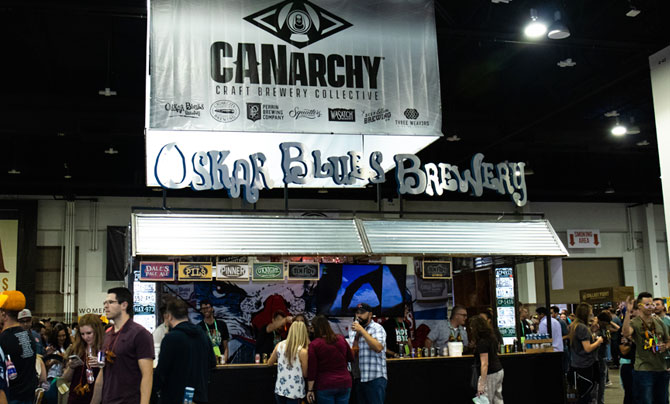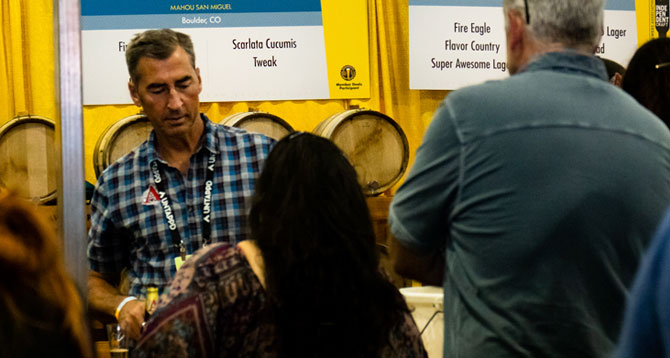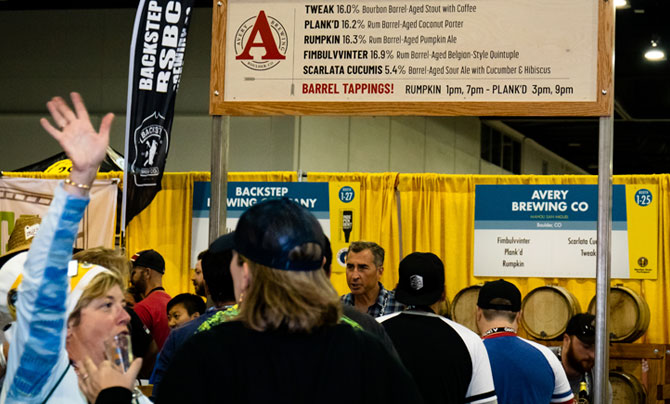
Want to stand out at the Great American Beer Festival? Open your checkbook.
At the 2019 GABF, put on by industry trade group the Brewers Association, large activations from deep-pocketed corporations took center stage, drawing throngs of beer drinkers to sprawling setups that included TVs, bar games and live music while 800 breweries pouring 4,000 beers scrapped for attention inside the Denver Convention Center.
In fact, a spirits company made the biggest impression during this year’s festival as the Pernod Ricard-owned Jameson Irish Whiskey label secured a sponsorship that included nearly 13,000 sq. ft. of real estate on the festival floor. Aimed at promoting its Caskmates collaboration series, Jameson poured a selection of barrel-aged beers for thousands of fest-goers, while live bands performed on a mini stage.
Meanwhile, Buffalo Wild Wings gave away thousands of wings, poured dozens of different craft beers from around the U.S., and showed live college and pro football games on several TVs in a pop-up sports bar.
GABF attendees flocked to these areas of the show, weaving their way past hundreds of other breweries just to catch a glimpse of a game or a live performance.
As difficult as it already was for breweries to stand out, these components created more competition and left some beer companies searching for creative ways to generate buzz and justify the investment into GABF.

One beer company that benefited from the larger activations was Revolution Brewing. In addition to pouring beer at its own standard 6-foot booth, the Chicago-based brewery also had beer on tap in the Buffalo Wild Wings and Jameson Caskmates areas.
“The companies that are doing it well are partnering with other organizations and that can help their lift,” Revolution chief commercial officer Donn Bichsel told Brewbound.
Bichsel also pointed to the Canarchy Brewery Collective’s activation, which featured all seven brewery partners and a silent disco.
“When you see it, it’s absolutely one of the most spectacular things that happened,” he said.
Deep Ellum Brewing founder John Reardon, who sold his brewery to Canarchy earlier this year, believes the long lines at his booth — along with sister breweries Oskar Blues, Cigar City, Three Weavers, Squatters, Wasatch and Perrin Brewing — was validation that the private equity-backed craft brewery rollup is resonating with consumers.
“It’s like a mini-beer festival in the festival,” he said.

According to Reardon, the current competitive landscape makes marketing essential to building interest in its brands. But even Reardon admitted that Jameson’s marketing was winning the day at the GABF.
“I think they’re telling the stories of some of those brewers that are in that area better than the brewers are telling it in their own booth,” he said.
Nevertheless, some craft brewers were able to make an impression on festival goers by investing in end caps, which ranged in size and price. A 10-foot-by-10-foot end cap fetched between $4,500 and $8,000, while a 10-foot-by-20-foot space cost as much as $15,000.

Colorado’s Weldwerks Brewing, one of the smaller breweries to invest in a 10-by-10 featured space, upgraded to a larger booth in an effort to improve the beer drinking experience, co-founder and Neil Fisher told Brewbound.
Last year, the Greely-based craft brewery drew lines that spilled into other breweries’ spaces, so Fisher paid the extra fare to relocate.
Fisher said Weldwerks gave away at least $10,000 in high-end beer to pour at the festival in order to give consumers what they desire. Over the course of two sessions, he estimated the company had served more than 12,000 1 oz. pours.
“Really the beer cost is what’s hard for us,” he said. “We have four different barrel-aged stouts that all sell for about $25 to $28 a 22 oz. bottle.”
All in, Weldwerks, which is on pace to sell just 6,000 barrels this year, spent about $20,000 to pour at the festival, Fisher said.
“We’re getting in front of a lot of people, which is our goal,” he said.
Another, sizable Colorado beer company, Left Hand Brewing, also purchased a featured booth space, which COO Chris Lennert said was an essential part of connecting with its core consumers in Colorado, as well as the other 42 states where it distributes beer.
“For us, it’s marketing,” he said. “It’s part of what we do and part of the industry. That’s how we look at it.”

Meanwhile, another Colorado brewery, Avery Brewing, was forced out of its featured space this year due to 2017 rules changes that bar non BA-defined craft brewers from purchasing sponsorships and expanded booth space at the GABF.
Avery, which sold a minority stake to Mahou San Miguel last year, has historically been one of the most popular stops at the festival.
Despite not having preferred placement on the show floor, founder Adam Avery, who poured beer during the Thursday and Friday night sessions, told Brewbound that his company still drew long lines for its barrel-aged offerings. Avery estimated that he spent about $10,000 to build and staff the booth for three days, while also pouring expensive beers that could have netted the company as much as $15,000 at retail.
“I had no problem spending it because it was going to the BA, and I believe in what the BA is trying to do as a trade organization,” he said, adding that not one person who visited his booth mentioned independence.
“It’s a non-issue to me, and so far it seems to be a non-issue to almost everybody that I know,” he said.

Even though it’s become increasingly more difficult to stand out at the country’s largest beer festival, some regional breweries still chose to scale back their investments. Oregon’s Ninkasi, which had a featured spot in previous years, opted for a standard 6-foot booth space, while Utah’s Uinta Brewing, which has purchased large end caps in previous years, downsized to half of an end cap.
Uinta chief marketing officer Jeremy Ragonese told Brewbound that the company decided to cut back in order to reallocate resources.
“It’s just a reality of the times,” he said. “We have to prioritize and ultimately I don’t think we’re losing anything by just having half of the end cap. So it’s a little bit of give and take.”
Ragonese believes that national brands and regional players need to spend money to make an impression on festival goers.
“We’ve invested in it primarily because it’s the biggest trade show for our industry, but also because we have that ambition,” he said. “For smaller breweries, what they’re trying to do is really get the word out, get their beer sampled and get their brand a little bit more recognizable.”

Still, spending more money doesn’t guarantee that a brewery will make an impression. Bryant Goulding, co-founder of Rhinegeist, told Brewbound that it’s important to use a featured space to articulate who you are as a brand. This year, the Cincinnati beer company purchased a featured space for the first time, which featured a minimalistic beer shed look with a slick, well-lit company logo.
“You can spend money and do something that’s impressionable but what are you actually saying?” Goulding added. “You can put a bunch of models in a booth and get people to drink your beer, but you put your people behind there that can speak to what you stand for and what your beer means, and that really reverberates.”
Of course, sought-after brewers — including California’s Russian River Brewing, Florida’s Funky Buddha Brewery, and Indiana’s 3 Floyds — didn’t need to pay for a premium space in order to draw a crowd.

And some smaller, relatively unknown companies that weren’t ready to invest in featured sponsorships also found creative ways to stand out. Massachusetts-based Castle Island Brewing grabbed attention not only for its silver medal-winning Lager, but also for a creative promotion in which the beer company offered to mail “Greetings from GABF” postcards that it gave away to festival goers. Founder Adam Romanow told Brewbound that the postcard promotion is something his company does at its taproom.
“No one really writes handwritten notes anymore,” he said. “We think it’s a lost art that should remain alive.”
Castle Island, which only sells beer in Massachusetts, mailed nearly 400 postcards to 38 states, Puerto Rico and Washington, D.C., Romanow said. Between postage, and the postcards themselves, he estimates the company spent about $150.
“It would be even better if we did ship out of state because we’d actually be exposing ourselves to potential customers,” he said. “But we’ve had countless people come up and say they’re coming to Boston in the next couple of months or they’re going to be there next year and they’re already planning to stop by the brewery.”
Meanwhile, Robert Finkel, founder of Chicago’s Forbidden Root Brewery and Restaurant, prioritized presentation and poured his botanic beers from antique glass pitchers.
“The connection is we care about what’s in the pitcher,” he said. “I’d rather not give you a cheap commodity pitcher because that’s not who we are.”
Finkel added that “99.5 percent” of the drinkers visiting his booth wouldn’t notice the nuances of the pitchers, such as the embossed flower.
“For the people who observe those details, those are our people,” he said.
